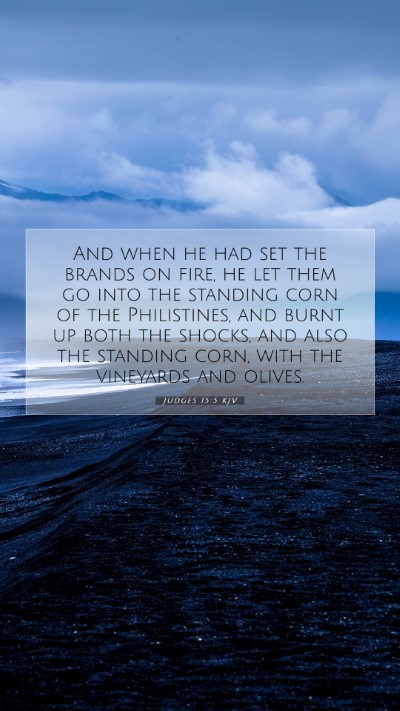Old Testament
Genesis Exodus Leviticus Numbers Deuteronomy Joshua Judges Ruth 1 Samuel 2 Samuel 1 Kings 2 Kings 1 Chronicles 2 Chronicles Ezra Nehemiah Esther Job Psalms Proverbs Ecclesiastes Song of Solomon Isaiah Jeremiah Lamentations Ezekiel Daniel Hosea Joel Amos Obadiah Jonah Micah Nahum Habakkuk Zephaniah Haggai Zechariah MalachiJudges 15:5 Meaning
What is the meaning of Judges 15:5?
And when he had set the brands on fire, he let them go into the standing corn of the Philistines, and burnt up both the shocks, and also the standing corn, with the vineyards and olives.
Judges 15:5 Bible Verse Meaning
Understanding Judges 15:5
“And when he had set the brands on fire, he let them go into the standing corn of the Philistines, and burnt up both the shocks, and also the standing corn, with the vineyards and olives.”This verse describes a significant event in the life of Samson, highlighting the complexities of his character and the conflicts between the Israelites and the Philistines. The actions taken by Samson can be interpreted in various ways, shedding light on themes of revenge, divine assistance, and the fulfillment of God’s purpose.
Bible Verse Meanings and Interpretations
- Symbolism of Fire: Fire often represents judgment and purification within Scripture. In this instance, Samson employs fire as a means of divine judgment against the Philistines, who were oppressing his people. This act symbolizes a turning point in the ongoing conflict, sparking a series of events ultimately leading to a confrontation with the Philistines.
- Retribution and Revenge: Samson's act of burning the crops can be viewed as justified retaliation against the Philistines for their wrongdoing against Israel. The historical context suggests that such acts were seen as necessary under the ancient laws of warfare, wherein the destruction of one’s enemies was commonplace.
- Divine Intervention: Commentators like Matthew Henry suggest that Samson’s actions reflect God’s involvement in Israel's affairs. His strength and cunning serve to fulfill God's plan to deliver Israel from Philistine dominance, emphasizing that God often uses flawed individuals to achieve His purposes.
- Cultural Context: Albert Barnes notes the agrarian nature of the society at the time. The destruction of grain and vineyards would have significant impacts on the Philistine economy, further demonstrating the severity and seriousness of Samson's protest against their oppression.
In-Depth Biblical Exegesis
Adam Clarke provides valuable insights into the incident, exploring the psychological and social implications of Samson's actions. The burning of the standing corn indicates a strategic blow to the Philistines’ food supply, a crucial tactic in disabling the enemy’s resources during warfare. This act not only served as retribution but also represented an attempt to rally the people of Israel against their oppressors.
Application of the Verse in Daily Life
- Understanding Our Actions: As modern readers, we are reminded to consider the motives behind our actions. Like Samson, who acted out of anger and zeal, we should reflect on our own responses to wrongdoings, ensuring they align with our ethical and moral values.
- Resource Stewardship: The significance of agricultural destruction in this passage prompts us to evaluate our stewardship of resources in our own lives. How do we protect what is valuable, and how do our actions reflect our priorities?
- Collective Resistance: This scripture also encourages us to stand against oppression. Just as Samson took a stand, we are called to act against injustices in our world, informed by our faith and reliance on God’s guidance.
Related Cross References
- Judges 14:1-4: Samson's motivations and the background of his conflict with the Philistines.
- Judges 16:21-30: The ultimate consequences of Samson’s battles with the Philistines and his fate.
- Exodus 22:5: The laws regarding the destruction of another’s property highlight the severity of Samson’s actions.
- 1 Samuel 14:30: A similar theme of destroying enemy resources is present in Saul's actions against the Philistines.
- 2 Corinthians 10:4: The spiritual warfare theme connects to the physical battles faced by the Israelites.
Conclusion
Judges 15:5 serves as a profound reflection of Samson’s complex character and the ongoing conflict between the Israelites and the Philistines. Through careful analysis, we extract rich meanings and applications relevant to our own lives. By understanding the significance of such verses, we deepen our Bible study insights and gain a more profound understanding of Scripture.


